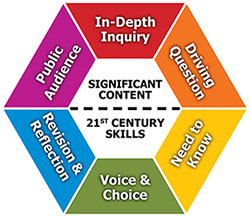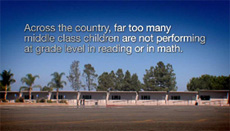 |

|
The Dangers of the Common Core Agenda
The Common Core initiative now being implemented in most states is intended to set high and uniform standards for student learning in elementary and secondary schools. For a variety of reasons, however, it will likely prove to be one more expensive and counterproductive episode in the long history of educational faddism.
One key but little discussed reason for its probable lack of effect is its inattention to existing deficiencies in student tool skills. For example, only 1/3 of students are mastering reading by grade 4. Students who are unable to read are likely to find the Common Core standards well beyond their reach. Researchers at the Brookings Institution and Stanford's Hoover Institution have expressed other reservations.
Other critiques of Common Core focus on its legitimacy as a policy initiative, its viability of its testing and accountability plans, and its costs. In the 1990s, the performance assessment type of student testing now being implemented as part of the federal Common Core initiative was tried and failed catastrophically when implemented statewide in Kentucky. The outcome had been predicted by experts on the basis of previous studies and known risks associated with performance assessments. Should the assessments now being rushed to development prove to be flawed or unworkable, the enormous gains in state-level school and teacher accountability that have emerged over the last 20 years may be permanently undone.
In short, there are numerous reasons as to why consumers should be concerned about whether Common Core will deliver on its promises and about the risks it poses the future of school accountability.
|
 |
Is Teaching to the Test a Problem? It Depends...
Richard Phelps, author of the classic Kill the Messenger: The War on Standardized Testing, has written an article featured in the Autumn 2011 issue of the Wilson Quarterly. Among other things, he notes that "most of the problems with testing have one surprising source: cheating by school administrators and teachers." Click here for more.
|
 |
Tests, Testing, and Genuine School Reform
In this 2011 book, one of America's foremost scholars on what works in education discusses the proper role of testing in educational improvement, covering well-established principles of testing, current problems, and promising evidence-based solutions.Click here for more on the book or to order a copy.
|
 |
Crazy U Highlights the Travails of the College Admissions Process
Author Andrew Ferguson chronicles his attempts to get his son into a top-flight college, all while questioning the value of the question he'll ultimately receive. This is an insightful and thorough look at the frustrations of parents and the shortcomings of the admissions process. Order it here.
|
| |
Confessions of a Misspent Youth
New York's New American Academy is thought to be the cutting edge of experiments in educational improvement. The New York Times says it was founded with the strong backing of former NYC Schools Chancellor Joel Klein. In fact, it is one more variant of type of schooling that has been tried repeatedly and with disastrous results. England's Summerhill School is a residential version that was founded in the nineteen twenties. Click here to read a Newsweek essay by Mara Wolynkski, a writer and television personality who attended such a school as a child.
|
 |
Standing and Delivering: What the Movie Didn't Tell
In this book, Dr. Henry Gradillas, Jaime Escalante's principal at Garfield High School, shares both his upbeat philosophy of education and the practical school management techniques that helped translate that philosophy into success for thousands of students over three decades. The book focuses on three areas that are key to the operation of an effective school: School climate, instruction, and curriculum. It includes many references to the Garfield experience, as well as to other schools where Gradillas was at the helm. See more, and buy the book, here.
"I read it on the plane coming back from Thanksgiving in California. I disturbed my wife and son with my frantic underlining and frequent exclamations of wonder and surprise." - Jay Matthews , reviewing the book here
|
 |
The Cartel Now Available for Home Purchase
The Cartel, acclaimed for its work in exposing the corruption in American public education, is now available for purchase, either for home use or for screenings in public settings. Go here to learn more about the film or to order, or visit the main project website here.
|
 |
"Waiting for Superman" Documentary Engages the Public in Improving K-12 Public Education
"Waiting for Superman," a new documentary film from Davis Guggenheim (an Oscar Winner for "An Inconvenient Truth"), is proving to be an excellent tool for education and engaging the public in school improvement. View the film's website here; read a review of the film in the National Catholic Reporter here.
|
 |
Pacific Research Institute Releases "Note as Good as You Think"
Not as Good as You Think: The Myth of the Middle Class School is a documentary that shatters the myth that “good” schools located in “nice” neighborhoods are shielded from the education crisis that pervades schools in poor, urban areas. ECF president Dr. John Stone is featured in the film, which is currently available on DVD. See a trailer here, or purchase here.
|
 |
LA Times Features Extensive Report on Value-Added Assessment
When Terry Grier joined San Diego USD as superintendent, he brought with him a desire to use value-added assessment in his school improvement efforts. Resistance by the education establishment to this and other initiatives led to his departure, and the conflict led the fourth largest newspaper in the US to report on the importance of value-added assessment in its print and online editions. The feature article can be found here, with supplemental resources as follows:
|
 |
If Standardized Testing is Such a Valuable Tool for School Improvement, Why do so Many Educators Oppose It?
The key difference is one of perspective. Parents, policymakers, and the consuming public view public education as a human development resource. Their top priority is literacy, numeracy, and the other educational outcomes that prepare youth to be productive members of adult society. Educators want these same outcomes but consider a broad range of other objectives to be of equal or greater importance.
This conflict mostly stays below the public's radar, but it occasionally bubbles up as a political battle between educators and elected officials about accountability. Tennessee and other states now implementing their Race to the Top Reforms are now experiencing the full blown problem.
Author Richard Phelps' classic Kill the Messenger: The War on Standardized Testing describes the issue and analyzes the arguments that non-educators must understand in order to defend and advance the public's educational goals.
J. E. Stone's preface to the 2005 edition frames the issue and outlines the chapters.
|
 |
Recommended: Annual Growth, Catch-Up Growth
This book, referenced by Dr. Stone at the Value-Added Achievement Awards ceremony, details easy to replicate and proven methods used by one school district to assure student achievement in reading and math. Go here to learn more and to order this book.
|
| |
Garrison Keillor Speaks Out
The host of A Prairie Home Companion, and author of numerous books, makes the case for the No Child Left Behind Act and Reading First in this article on Salon.com.
|
 |
Movie Trailer: Two Million Minutes
Regardless of nationality, as soon as a student completes the 8th grade, the clock starts ticking. From that very moment the child has approximately two million minutes until high school graduation. How do they spend their time in the US, as compared with India and China? Click here to see a trailer for this new movie.
|
|
|
|
© 2013 Education Consumers ClearingHouse™ All Rights Reserved.
1655 North Fort Myer Drive, Suite 700, Arlington, VA 22209 | Phone (703) 248-2611, Fax (703) 525-8841 |










